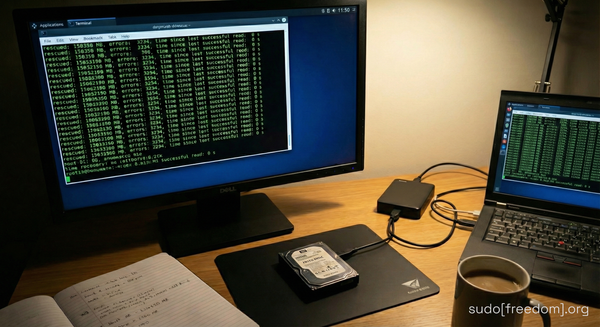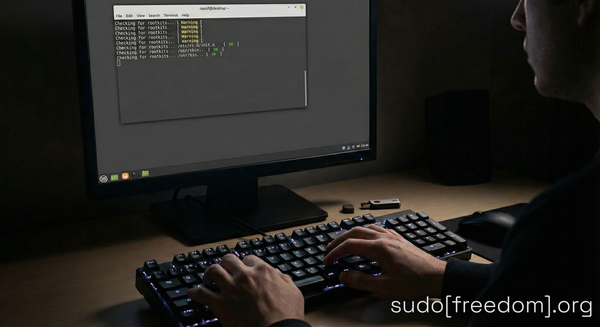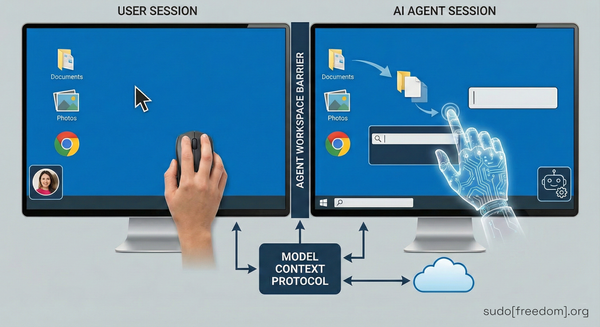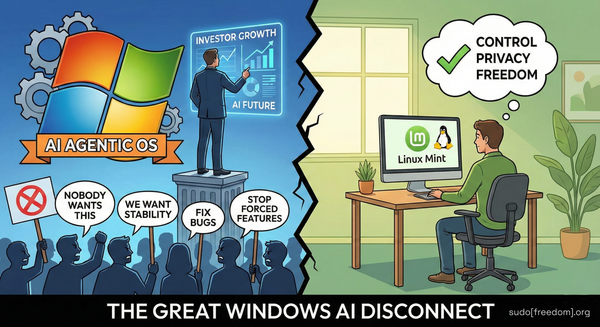Your Data, Your Rules: Why Privacy Isn't Optional Anymore
A little initial inconvenience can be the difference between digital sovereignty, or waking up one day with a bag over your head, dragged away for something a machine flagged in the name of "security."

Right now, as you read this, dozens of data brokers are building a profile of you. They know what you buy, where you go, who you talk to, and increasingly, what you're likely to do next.
This isn't the paranoid fantasy of privacy advocates anymore. It's Wednesday.
The Invisible Auction
Every time you open an app, visit a website, or even walk past a store with location services enabled, you're participating in an auction you never agreed to join. Companies bid on your attention in real-time, using data profiles so detailed they often know you better than you know yourself.
Google processes over 8.5 billion searches daily, each one feeding machine learning models that predict and influence human behavior. Meta's algorithms analyze the micro-expressions in your photos to determine your emotional state. Microsoft's AI tools watch how you work, learning your patterns to optimize not just productivity, but profitability.
The promise was personalization. The reality is manipulation.
When Free Becomes Expensive
"If you're not paying for the product, you are the product" has become a cliché because it's true. But it's worse than that now. Even when you are paying, you're still the product.
Consider this: you pay for Windows, and Microsoft still harvests your data. You buy an iPhone, and Apple still controls what software you can install. You subscribe to streaming services that track your viewing habits to sell to advertisers.
The business model isn't just surveillance capitalism anymore. It's digital feudalism. You don't own your devices, your data, or your digital life. You rent access to them, under terms that change without your consent.
The AI Amplifier
Artificial intelligence has transformed this from an annoying privacy problem into an existential one. AI doesn't just collect your data; it weaponizes it.
These systems can predict your behavior, influence your decisions, and shape your reality in ways that feel organic but aren't. The recommendation algorithm that keeps you scrolling isn't neutral. The search results that answer your questions aren't unbiased. The job listings you see, the news that reaches you, the people suggested as friends, all of it runs through AI systems optimized for engagement and profit, not truth or wellbeing.
When AI makes decisions about your life, who's really in control?
The Real Cost of Convenience
We traded privacy for convenience and got neither.
Modern digital life is frustrating, buggy, and increasingly expensive. Software that worked fine yesterday breaks with forced updates. Services you rely on disappear when companies change strategy. Features you paid for vanish behind new subscription walls.
Meanwhile, your personal data, the very thing you gave up for all this "convenience," gets sold to the highest bidder, leaked in data breaches, or used to train AI systems that compete with human workers.
The convenience was temporary. The surveillance is permanent.
There's Another Path
Open source isn't just about free software. It's about freedom, period.
When you use Linux instead of Windows, you're not just changing operating systems. You're choosing software that can't spy on you because you can see exactly what it does. When you use Signal instead of WhatsApp, you're choosing communication that's actually private. When you host your own cloud storage instead of using Google Drive, you're choosing to own your data.
Yes, it requires learning new things. Yes, it takes time to set up. But sometimes, a little initial inconvenience (a few hours learning how to use Linux, host your own cloud, or escape from algorithmic feeds) can be the difference between digital sovereignty, or waking up one day with a bag over your head, dragged away for something a machine flagged in the name of "security."
You never know, you may like it. It might even turn into a hobby.
Consider the alternative: spending the rest of your digital life as a sharecropper on someone else's platform, hoping they don't change the rules.
Here, you make the rules.
Breaking Out of the Digital Prison
That's exactly why sudo[freedom].org exists. Our mission is simple: help you escape this digital prison, step by step, without drowning you in technical jargon.
We'll show you how to install a Linux distribution that actually respects your privacy. How to set up a home server so your data stays yours. How to use nodes to sync your files without depending on Big Tech clouds. All explained clearly, practically, and without assuming you're already a system administrator.
Our goal isn't to turn you into a cybersecurity expert overnight. We'll give you the practical tools and clear guidance to reclaim your digital freedom, then point you to the resources you need to go as deep as you want.
What You Can Do Right Now
You don't have to become a digital hermit to reclaim your privacy. Start small:
Replace one Big Tech service this month. Try Proton Mail instead of Gmail, or DuckDuckGo instead of Google Search.
Learn about one open source alternative. Install Linux Mint on an old laptop, or try LibreOffice instead of Microsoft Office.
Audit your digital footprint. Check what data Google has on you (takeout.google.com), review your Facebook privacy settings, see what data brokers know about you.
Support privacy-focused companies. Buy from companies that make money from customers, not from selling customer data.
The Future We Choose
Technology should serve people, not the other way around. AI should amplify human potential, not replace human judgment. Privacy should be the default, not a premium feature.
This isn't about going backward. It's about going forward in the right direction.
The tools exist. The communities exist. The alternatives exist. What's missing is the decision to use them.
Your data, your rules. Your devices, your control. Your digital life, your choice.
The question isn't whether you can afford to care about privacy anymore.
It's whether you can afford not to.
![sudo[freedom].org](https://sudofreedom.org/content/images/2025/08/sudo.png)
![sudo[freedom]](/content/images/size/w160/2025/08/square.svg)



